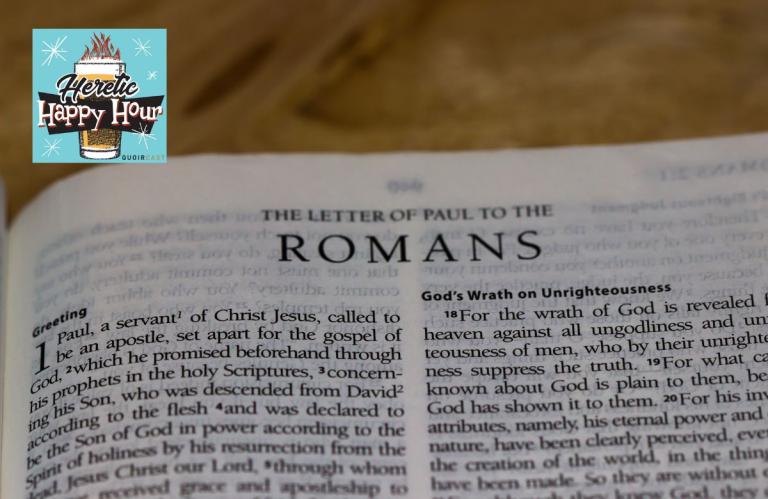Reading the Book of Romans is no small task. For many, it’s the cornerstone of Christian theology, touching on everything from salvation to the nature of sin. But how should we approach it today, especially if you’re someone who no longer identifies as a Christian? It’s a question worth exploring, and it’s one I’ve been tackling alongside Keith Giles in our book, Reading Romans Right. I also discuss it in a recent episode of Heretic Happy Hour. Here’s how I believe we should read Romans—free from theological baggage and open to what Paul was really trying to say.
Approaching Romans as a Literary Critic
First and foremost, I don’t approach Romans like a typical believer. I come to it more like an historian, a philosopher, or a literary critic. I don’t give the Bible authority over my life, and whether I’m “right” or “wrong” in my reading doesn’t change how I live day-to-day. This detachment allows for a more objective analysis of the text, one that isn’t clouded by the need to defend a particular dogma or tradition.
When we approach Romans, we should first ask: what was Paul really trying to say in the historical and cultural context of his time? This is crucial. Too often, Romans is read as if Paul is addressing modern issues, but that’s not the case. Paul was addressing specific problems facing the early Christian communities—problems that have little to do with the contemporary questions we often impose on the text.
Paul’s Audience and His Rhetoric
Unlike his letters to the Galatians, Paul didn’t found the church in Rome. This means he was writing to a community that wasn’t intimately familiar with him or his theology. And that matters. Paul’s letter to the Romans had to address not only those who shared his views but also false teachers who were circulating different ideas about the gospel and salvation. Romans, then, is a letter where Paul sets up arguments—sometimes playing the role of these false teachers—and then dismantles them to make his case.
The first key section in Romans, beginning at 1:18, introduces the voice of the false teacher, who rails against Gentiles, listing sins and vices to stir up a sense of superiority and judgment among the Roman Christians. This is where we often see the homophobic rhetoric that people mistakenly attribute to Paul. But in reality, this section is Paul quoting typical anti-Gentile rhetoric from sources like The Wisdom of Solomon—rhetoric his audience would have been familiar with.
By the time we reach Romans 2:1, Paul flips the script. “Therefore, you have no excuse, whoever you are,” he says, addressing those who pass judgment on others. In essence, Paul is saying, “If you’re using this anti-Gentile rhetoric to condemn others, you’re just as guilty.” This is where Paul starts to deconstruct the hypocrisy of the false teacher’s argument.
The Wrath of God—or Is It?
Another significant misunderstanding about Romans is the concept of “wrath.” In Romans 2:5, for example, many translations speak of “the day of God’s wrath.” But Paul isn’t talking about divine punishment raining down from the sky. He’s warning against the self-inflicted consequences of judgment and hypocrisy. As theologian Brad Jersak points out, it’s like throwing a hammer up in the air and having it come crashing down on your own head. God isn’t throwing the hammer—human beings are.
Paul’s real message is about self-destruction, not divine retribution. The so-called “day of wrath” is when our own actions—our hard-heartedness and judgment—come back to haunt us.
Salvation: Not Just for Some, But for All
As we move through Romans 3 and 4, Paul continues to deconstruct the arguments of the false teachers, leading us to a profound conclusion: if we judge others by the false teacher’s standards, then we’re all condemned. There’s no room for anyone to claim moral superiority, Jew or Gentile alike. This, Paul argues, is why salvation is only through the faithfulness of Christ.
It’s a radical message. Paul isn’t saying that some are saved because of their faith and others are damned. He’s saying that, by the faithfulness of Christ, everyone is saved. This salvation isn’t contingent on human actions, not even on faith itself. It’s entirely based on Christ’s faithfulness, independent of our belief or disbelief.
For Paul, this is what makes the gospel good news: it’s not about who’s in and who’s out. It’s about God’s mercy extended to everyone, regardless of their adherence to religious markers like circumcision or Sabbath-keeping.
The False Gospel of Judgment
Unfortunately, Paul’s message has been distorted over the centuries. Many Christians today still believe in a God who condemns, who keeps score, and who demands belief as a prerequisite for salvation. But this isn’t the God Paul preached. If we’re reading Romans correctly, we see a God who is “wholly merciful, wholly benevolent,” as revealed in the person of Christ. A God who, if all are condemned, chooses to be merciful to all.
This is the real gospel. It’s not about earning salvation through faith or works. It’s about trusting in a God who saves all, even when we don’t “deserve it.”
Conclusion: Reading Romans Right
In Reading Romans Right, Keith Giles and I argue that we’ve misunderstood Paul for far too long. His letter to the Romans is a masterful argument against judgment, hypocrisy, and exclusion. It’s an invitation to trust in a God who is merciful to all, not just those who meet certain religious criteria.
So, if you’re reading Romans today, read it with fresh eyes. Don’t let centuries of theological baggage weigh you down. Instead, approach it as a conversation between Paul and his opponents, and pay close attention to the ways Paul deconstructs judgment and invites us into a gospel of radical inclusion. If we do that, we’ll find that Romans isn’t just a relic of the past—it’s a message we desperately need today.
Also, if you’ve been digging my work on here, and want to see me be able to continue writing as close to full-time as humanly possible, please take a look at my Patreon page at www.patreon.com/mjdistefano. Even $1 a month helps bigly!















